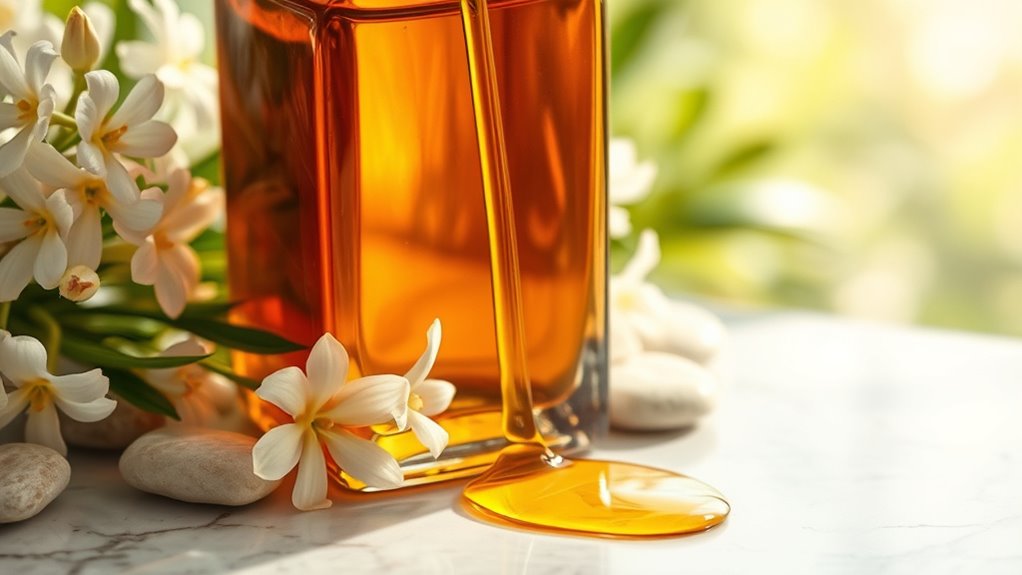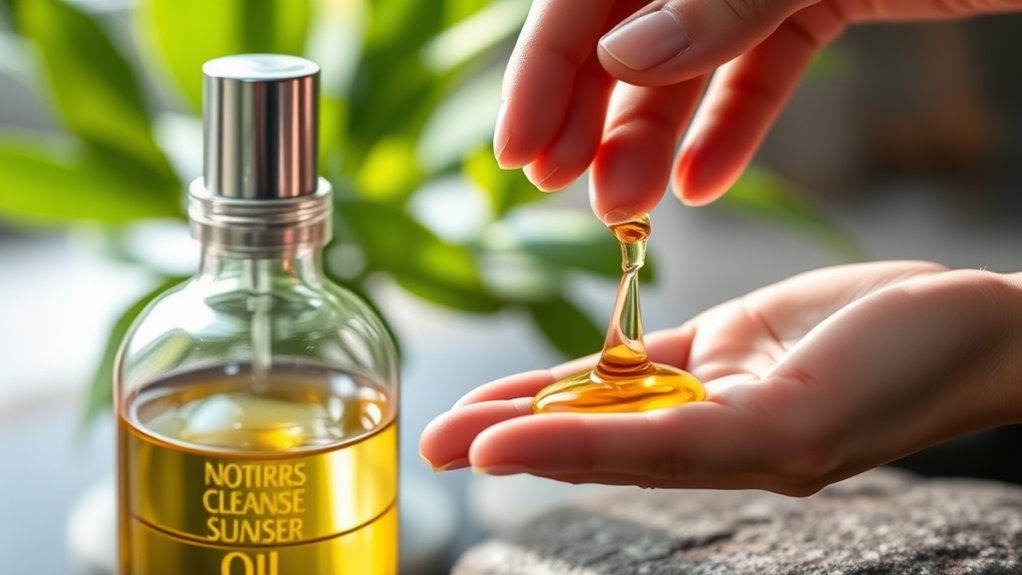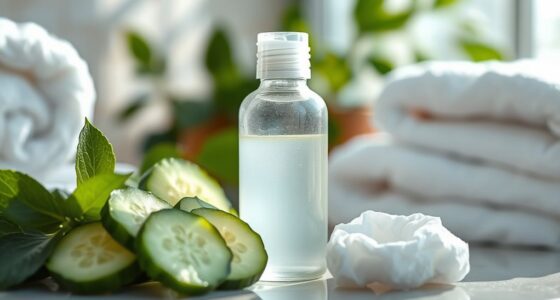Oil cleansing lets you effortlessly dissolve dirt and makeup while keeping your skin hydrated and balanced. By using oils like jojoba or olive, you bond with impurities without stripping away natural moisture. This gentle method maintains your skin’s lipid barrier and reduces irritation, making it perfect for any skin type. Plus, it helps prevent overproduction of oil and promotes long-term skin health. Want to find the best oil for your skin type? There’s more to discover!
Key Takeaways
- Oil cleansing effectively removes dirt and makeup while maintaining the skin’s natural hydration and lipid barrier.
- The “like dissolves like” principle allows oils to bond with and lift away impurities from the skin.
- Gentle oils such as jojoba or olive oil help dissolve excess sebum without stripping moisture or causing irritation.
- Using oil cleansers reduces the risk of disrupting the skin’s pH balance compared to traditional harsh cleansers.
- Long-term oil cleansing can promote healthier skin by preventing overstripping and preserving beneficial bacteria.

Oil cleansing has gained popularity as a game-changing skincare method that effectively balances and cleans your skin without the harshness of traditional water-based cleansers. This method relies on the principle of “like dissolves like,” where oils work to dissolve excess sebum and dirt. By using oils instead of conventional cleansers, you can maintain your skin’s natural lipid barrier and microbiome, which is vital for healthy skin.
Experience the transformative power of oil cleansing for a balanced, gentle skincare routine that preserves your skin’s natural health.
When you try oil cleansing, you’ll notice how it effortlessly removes makeup, dirt, and excess sebum without stripping away your skin’s natural moisture. This gentle approach can be particularly beneficial if you have dry, sensitive, or even oily skin. By massaging the oil into your skin, you help to clean out clogged pores and reduce the appearance of blackheads and whiteheads. Additionally, certain cold medications can cause dryness and irritation, making oil cleansing an excellent alternative for maintaining skin hydration during treatment. Furthermore, the use of oil cleansing can help prevent pests such as aphids from affecting your skin, ensuring a healthier complexion. Regular oil cleansing can also enhance skin hydration and moisture retention, providing a more supple and glowing appearance.
Plus, the antioxidants in certain oils protect your skin from environmental stressors, while others promote skin regeneration and wound healing. Oil cleansing also helps remove dead skin, pollutants, and makeup more effectively than traditional cleansers.
Choosing the right oil for your skin type is essential. For dry skin, olive oil is a fantastic option due to its rich oleic acid content, which provides deep hydration. If you have oily skin, consider lighter oils like grapeseed or sunflower oil, which are high in linoleic acid. Jojoba oil is another great choice, as it mimics your skin’s natural sebum, helping regulate oil production.
For those looking for anti-inflammatory and anti-aging benefits, argan oil and rosehip oil are excellent additions to your routine. While coconut oil has antifungal and antibacterial properties, it may be too heavy for some, so keep that in mind.
The process of oil cleansing is simple yet effective. You massage the oil into your skin, allowing it to bond with dirt and excess sebum, lifting impurities away. After that, you remove the oil with a warm washcloth, which leaves your skin feeling hydrated and protected rather than stripped or tight.
This method is less likely to disrupt your skin’s pH balance compared to traditional cleansers, making it a gentler alternative. In contrast, traditional cleansers can strip your skin of natural oils and good bacteria, leading to imbalances and increased oil production.
Over time, harsh cleansers can cause long-term damage to your skin’s barrier function, leaving it feeling tight and irritated. By switching to oil cleansing, you’re giving your skin the care it deserves, without the risk of overstripping or irritation.
Frequently Asked Questions
Can Oil Cleansing Help With Acne-Prone Skin?
Yes, oil cleansing can definitely help with acne-prone skin. It dissolves excess sebum and impurities without stripping your skin’s natural moisture.
By effectively unclogging pores, it reduces the likelihood of breakouts. Plus, using non-comedogenic oils guarantees you won’t aggravate your acne.
With regular use, you’ll maintain a healthy moisture balance and can even benefit from the anti-inflammatory properties of certain oils.
Just remember to choose the right oils for your skin type.
How Often Should I Use Oil Cleansing?
Did you know that about 80% of people experience acne at some point in their lives?
You should consider oil cleansing daily, especially in the evening, to effectively remove impurities. If your skin’s oily, it can help balance oil production and minimize breakouts.
However, if your skin’s dry or sensitive, you might prefer every other day. Always listen to your skin and adjust based on how it reacts to the routine.
What Oils Are Best for Oil Cleansing?
When you’re choosing oils for oil cleansing, consider your skin type.
For oily skin, grapeseed and sunflower oils are great choices, as they balance oil without clogging pores.
If you have dry skin, opt for olive or avocado oil to provide hydration.
For sensitive skin, sweet almond or jojoba oil can be soothing.
Each oil has unique benefits, so pick one that suits your skin’s needs for the best results.
Can I Use Oil Cleansing on Sensitive Skin?
Yes, you can use oil cleansing on sensitive skin! It’s gentle and designed to remove impurities without irritation.
By choosing the right oil cleanser, you’ll help maintain your skin’s moisture barrier while effectively dissolving makeup and dirt. Look for natural ingredients that soothe your skin and avoid harsh additives.
Just remember to monitor how your skin reacts and adjust your routine if needed to keep it comfortable and balanced.
Is Oil Cleansing Suitable for All Skin Types?
Oil cleansing’s versatility makes it valuable for various skin types.
Whether you’ve got oily, dry, or sensitive skin, this method can work wonders. It effectively eliminates excess oil and impurities while maintaining moisture.
You’ll find that gentle ingredients like jojoba or lavender work beautifully for your skin’s specific needs.
Just make sure you choose high-quality oils and consider patch testing to keep your complexion carefree and radiant!
Embrace the cleansing charm!
Conclusion
Incorporating oil cleansing into your routine is like giving your skin a revitalizing drink of water. It gently dissolves dirt and makeup without stripping away essential moisture, leaving your complexion soft and radiant. By embracing this method, you’re not just cleaning your skin; you’re nurturing it. So, go ahead and let the oils work their magic, and watch your skin transform into a healthy, glowing canvas that feels as good as it looks.








